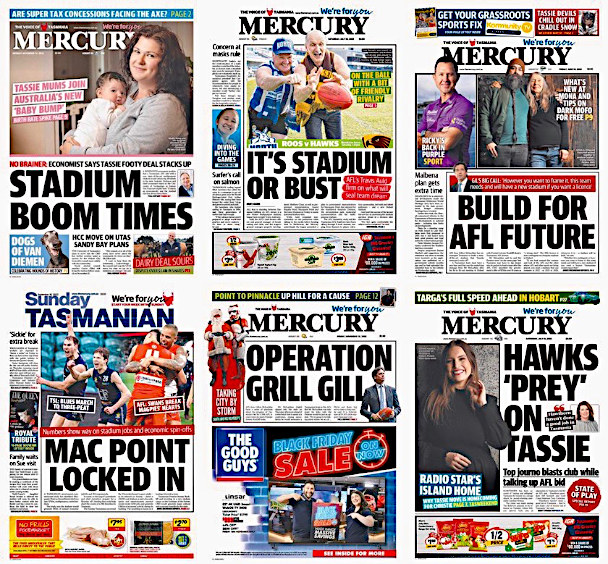Comment: The Mercury could disclose its ties to Foxtel in Tasmanian AFL team news coverage – but doesn’t

After a recent public meeting on the proposed AFL stadium in Hobart, an editorial in The Mercury bemoaned “outrageous claims” that were “designed to undermine the paper and the AFL’s move to the Apple Isle”. What claims it was referring to was left to the reader’s imagination.
A news story [paywall] provided a hint, reporting that author Richard Flanagan “said the Mercury’s support for the project was clouded by its parent company’s commercial interests in broadcasting AFL”.
A review of The Mercury’s news articles and editorials published since Flanagan spoke at a Planning Matters Alliance Tasmania public meeting reveals none disclose News Corp Australia’s financial stake associated with Foxtel’s AFL broadcast rights, except for the report above.
Should it? News Corp Australia is a member of the Australian Press Council, which states publishers should “ensure that conflicts of interests are avoided or adequately disclosed, and that they do not influence published material”.
The lack of disclosure may be an oversight, but the continued omission feeds the suspicion that The Mercury is not telling its readers the whole story on the push for the AFL team and new stadium.
In his speech (audio here), Flanagan prefaced his comments by stating that he was for a Tasmanian AFL team but opposes the proposed stadium at Macquarie Point, which could cost $1 billion or more. After pointing to the underfunding of public housing and a health system in crisis, he asked why the government was backing a new stadium.
He said:
“Well, follow the money. The Mercury is owned by News Corp, which is also the majority owner of Foxtel, which along with the Seven Network, have billions of dollars invested in AFL broadcast rights. A Tassie team gives Foxtel extra games meaning extra revenue and, with a new stadium, extra advertising potential and a bright new stage. All that equals more profit, just don’t expect the Murdoch’s to pay for their stadium.
That is why The Mercury is so strongly campaigning for what is no more and no less than an immense gift of our billion dollars to profit the Murdoch’s but not Hobartians. That is why The Mercury is so shamefully not reporting the opposition to the stadium, or the many issues that arise with the stadium.”
AFL broadcast rights and News Corp’s new sports betting bid
That Rupert Murdoch’s News Corp Australia owns The Mercury and 65 per cent of Foxtel is uncontroversial. It is also true that Seven West Media and Foxtel recently agreed to pay $4.5 billion for AFL broadcast rights from 2025 to 2031.
If a Tasmanian AFL team does eventuate in the 2027 season, avid supporters will be able to watch games broadcast by Seven on free-to-air TV and 7+ digital, except for some matches. Foxtel and Kayo have the rights to broadcast all games on their pay TV and digital services. For every 1000 new subscribers to Kayo and Foxtel, News Corp Australia’s subsidiary stands to gain revenue of between $140,000 and $650,000 yearly.
News Corp Australia could also gain from the company’s recent investment in the online sports betting company, Betr. Sportsbet has the AFL betting advertising rights, but this deal expires in 2025. The chief executive of Betr, Andrew Menz, told the Sydney Morning Herald that News Corp Australia’s involvement could “supercharge” the growth of the new gambling company. “If Betr was the AFL partner, you would likely see Betr integrated into the Fox Footy broadcast,” he said.
Does this potential financial interest motivate The Mercury’s news coverage of the push for an AFL team and a stadium? There is no direct evidence of that, and the editorial correctly stated it has featured dissenting voices in the letters to the editor and opinion columns.
The argument that its news coverage has been no different from how it has covered dissenting voices on other topics is more debatable. For example, Premier Jeremy Rockliff posted a “myth-busting” defence of the stadium to his Facebook page last week. The Mercury reproduced it as “Jeremy Rockliff debunks mistruths about a new Hobart stadium” without subjecting the claims to any scrutiny. The only semblance of balance was appending two comments clipped from Rockliff’s Facebook feed, one for and one against the stadium.
When Labor leader Rebecca White criticised the government’s “ridiculous proposal to spend $750 million on a floating stadium in Hobart” in her budget-in-reply speech in May, the editor of The Mercury, Craig Warhurst, was unimpressed. He penned an adjacent column [paywall] with the online version titled “Why Labor Leader Rebecca White has made the wrong call on a new Hobart AFL stadium”, complaining her comments put a Tasmanian team “at risk by showing the AFL there was, instead of unity, political division on key components of the AFL proposal”. (Labor and the Greens had agreed with the government to support a bid for an AFL team, but not a new publicly-funded stadium.)
Even if a comprehensive review of The Mercury’s news articles found they were fair to stadium critics and proponents alike, the same can’t be said of the front page. Since June 1, there have been 18 front pages on the proposed AFL team and stadium. Many have been boosterish, such as the headline “Stadium Boom Times”. The three negative AFL-related front pages have all been about Hawthorn, a team currently sponsored by the Tasmanian government.
If The Mercury wants to address criticism of its AFL stadium coverage, it would do well to embrace basic disclosure of its parent company’s financial interests and lift the quality of some of its news coverage.
 @BobBurtonoz
@BobBurtonoz